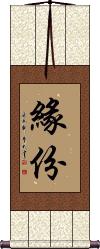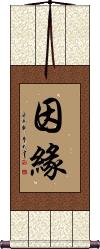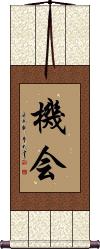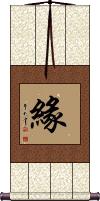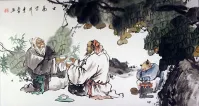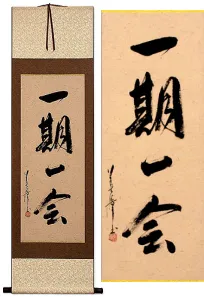Many custom options...
And formats...

Chance Meeting in Chinese / Japanese...
Buy a Chance Meeting calligraphy wall scroll here!
Personalize your custom “Chance Meeting” project by clicking the button next to your favorite “Chance Meeting” title below...
Fate / Chance Meeting
緣份 specifically represents the fate or destiny that brings two people together.
This is like the chance meeting of two people that leads sometime later to marriage.
This could also be the chance meeting of two business people who become partners and build a huge and successful company.
This idea is often associated with a fateful meeting leading to good fortune.
Some will define this word as “Destiny brings you two together” or “Meant to be.”
![]() Note: The second character can also be written without the left radical, as shown to the right. If you have a preference, please let use know in the special instructions for your project. There is no difference in meaning or pronunciation, just two (alternate) ways to write the same character.
Note: The second character can also be written without the left radical, as shown to the right. If you have a preference, please let use know in the special instructions for your project. There is no difference in meaning or pronunciation, just two (alternate) ways to write the same character.
See Also: Soulmates | Good Fortune
Fate / Opportunity / Chance
The Buddhist idea of Fate
因緣 is the Buddhist concept of a chance meeting or an opportunity that presents itself by fate.
Sometimes this is used to describe a cosmic chain of events or cause and effect.
It also is used to describe predestined relationships between people - and sometimes married couples (although if you want one about marriage, try this: Fate / Destiny of Lovers.
因緣 can also be translated as origin, karma, destiny, affinity, connection, and relation. This all depends on context - seen alone on a wall scroll, this will be read with a “fate/chance” meaning by a Chinese person or a Korean person who can read Hanja.
The more complex definition of this word would be, “Direct causes and indirect conditions, which underlie the actions of all things.”
This concept is known as nidana in the original Sanskrit. Also sometimes presented as hetupratyaya (or “hetu and prataya”), which I believe is Pali.
Note: Japanese will tend to use this version of the second Kanji: ![]()
If you order this from the Japanese master calligrapher, expect that you’ll get this version. However, this word often carries a negative connotation in Japanese (bad things happen), as it is used that way in a certain Japanese idiom. Therefore, this may not be the best choice if Japanese is your target language.
See Also: Buddhism | Opportunity
Opportunity
機会 is a common way to express “opportunity” in Japanese.
The first character means “chance,” and the second can be translated as “meeting.”
So in Japanese business, a “chance meeting” represents a real “opportunity.”
Note that this also means opportunity in Chinese, but it's more an oral or informal word in Mandarin. Also, the second Kanji is the same as the simplified version of the hui Chinese character.
Once in a Lifetime
This Japanese title can be translated as “for this time only,” “chance meeting,” “one meeting, one opportunity,” “never again,” or “one chance in a lifetime.”
The characters literally mean “one time one meeting” - of course, the Kanji characters have meaning far beyond a direct translation like this.
Some might use this proverb to talk of an opportunity that presents itself just once in your life. It could also be a one-and-only chance meeting with your true soul mate. An expression of any event that might happen once in a lifetime.
This is primarily a Japanese title, however, there is also a Traditional Chinese (and old Korean) version of this proverb. Just the last character is different.![]() The traditional form was used in Japan before WWII and in Korea prior to 1900. This title is somewhat known in China.
The traditional form was used in Japan before WWII and in Korea prior to 1900. This title is somewhat known in China.
If you want the older traditional form, just click on the character to the right.
The Mysterious Bond Between People
The invisible force that brings people together forever
緣 represents the fate that brings and bonds people together.
緣 is a complicated single character. It can mean a lot of different things depending on how you read it.
In Japanese, it can mean fate, destiny, a mysterious force that binds two people together, a relationship between two people, bond, link, connection, family ties, affinity, opportunity, or chance (to meet someone and start a relationship). It can also mean “someone to rely on,” relative, reminder, memento, or the female given name, Yori.
It's the same in Chinese, where it's defined as cause, reason, karma, fate, or predestined affinity.
In the Buddhist context, it's Pratyaya. This is the concept of indirect conditions, as opposed to direct causes. It's when something happens (meeting someone) by circumstance or a contributing environment. Instead of a direct cause or act, it is a conditioning cause without direct input or action by the involved people.
Occasionally, this character is used in a facetious way to say hem, seam, or edge of clothing. In this case, it's the seam that brings or holds the clothing together.
![]() Note: Japanese will tend to use the variant of this Kanji shown to the right. If you want this version (and are ordering this from the Japanese master calligrapher), click on the Kanji at the right instead of the button above.
Note: Japanese will tend to use the variant of this Kanji shown to the right. If you want this version (and are ordering this from the Japanese master calligrapher), click on the Kanji at the right instead of the button above.
This in-stock artwork might be what you are looking for, and ships right away...
Gallery Price: $268.00
Your Price: $148.77
Not the results for chance meeting that you were looking for?
Below are some entries from our dictionary that may match your chance meeting search...
| Characters If shown, 2nd row is Simp. Chinese |
Pronunciation Romanization |
Simple Dictionary Definition |
出会 see styles |
deai であい |
(noun/participle) (See 出会い・であい・1) encounter; chance meeting; (surname) Deai |
遭逢 see styles |
zāo féng zao1 feng2 tsao feng souhou / soho そうほう |
to encounter (something unpleasant) (noun/participle) meeting by chance; running into; coming upon; encounter |
回り合い see styles |
meguriai めぐりあい |
(kana only) chance meeting; fortuitous encounter |
巡り合い see styles |
meguriai めぐりあい |
(kana only) chance meeting; fortuitous encounter |
廻り合い see styles |
meguriai めぐりあい |
(kana only) chance meeting; fortuitous encounter |
めぐり合い see styles |
meguriai めぐりあい |
(kana only) chance meeting; fortuitous encounter |
袖すり合うも他生の縁 see styles |
sodesuriaumotashounoen / sodesuriaumotashonoen そですりあうもたしょうのえん |
(expression) (idiom) a meeting by chance is preordained |
袖すり合うも多生の縁 see styles |
sodesuriaumotashounoen / sodesuriaumotashonoen そですりあうもたしょうのえん |
(expression) (idiom) a meeting by chance is preordained |
袖振り合うも他生の縁 see styles |
sodefuriaumotashounoen / sodefuriaumotashonoen そでふりあうもたしょうのえん |
(expression) (proverb) a meeting by chance is preordained |
袖擦り合うも他生の縁 see styles |
sodesuriaumotashounoen / sodesuriaumotashonoen そですりあうもたしょうのえん |
(expression) (idiom) a meeting by chance is preordained |
袖擦り合うも多生の縁 see styles |
sodesuriaumotashounoen / sodesuriaumotashonoen そですりあうもたしょうのえん |
(expression) (idiom) a meeting by chance is preordained |
Variations: |
sodefuriaumotashounoen / sodefuriaumotashonoen そでふりあうもたしょうのえん |
(expression) (proverb) even a chance meeting can lead to a deep bond |
Variations: |
meguriai めぐりあい |
(kana only) chance meeting; fortuitous encounter |
Variations: |
sodesuriaumotashounoen / sodesuriaumotashonoen そですりあうもたしょうのえん |
(expression) (proverb) (See 袖振り合うも他生の縁) a meeting by chance is preordained |
Variations: |
sodefuriaumotashounoen / sodefuriaumotashonoen そでふりあうもたしょうのえん |
(expression) (proverb) even a chance meeting can lead to a deep bond; even a chance meeting is due to the karma of a previous life |
The following table may be helpful for those studying Chinese or Japanese...
| Title | Characters | Romaji (Romanized Japanese) | Various forms of Romanized Chinese | |
| Fate Chance Meeting | 緣份 / 緣分 缘份 / 缘分 | yuán fèn / yuan2 fen4 / yuan fen / yuanfen | yüan fen / yüanfen | |
| Fate Opportunity Chance | 因緣 因缘 / 因縁 | in nen / innen | yīn yuán / yin1 yuan2 / yin yuan / yinyuan | yin yüan / yinyüan |
| Opportunity | 機會 机会 | kikai | jī huì / ji1 hui4 / ji hui / jihui | chi hui / chihui |
| Once in a Lifetime | 一期一會 一期一会 | ichigo ichie ichigoichie | yī qī yī huì yi1 qi1 yi1 hui4 yi qi yi hui yiqiyihui | i ch`i i hui ichiihui i chi i hui |
| The Mysterious Bond Between People | 緣 / 縁 缘 | en | yuán / yuan2 / yuan | yüan |
| In some entries above you will see that characters have different versions above and below a line. In these cases, the characters above the line are Traditional Chinese, while the ones below are Simplified Chinese. | ||||
Successful Chinese Character and Japanese Kanji calligraphy searches within the last few hours...
